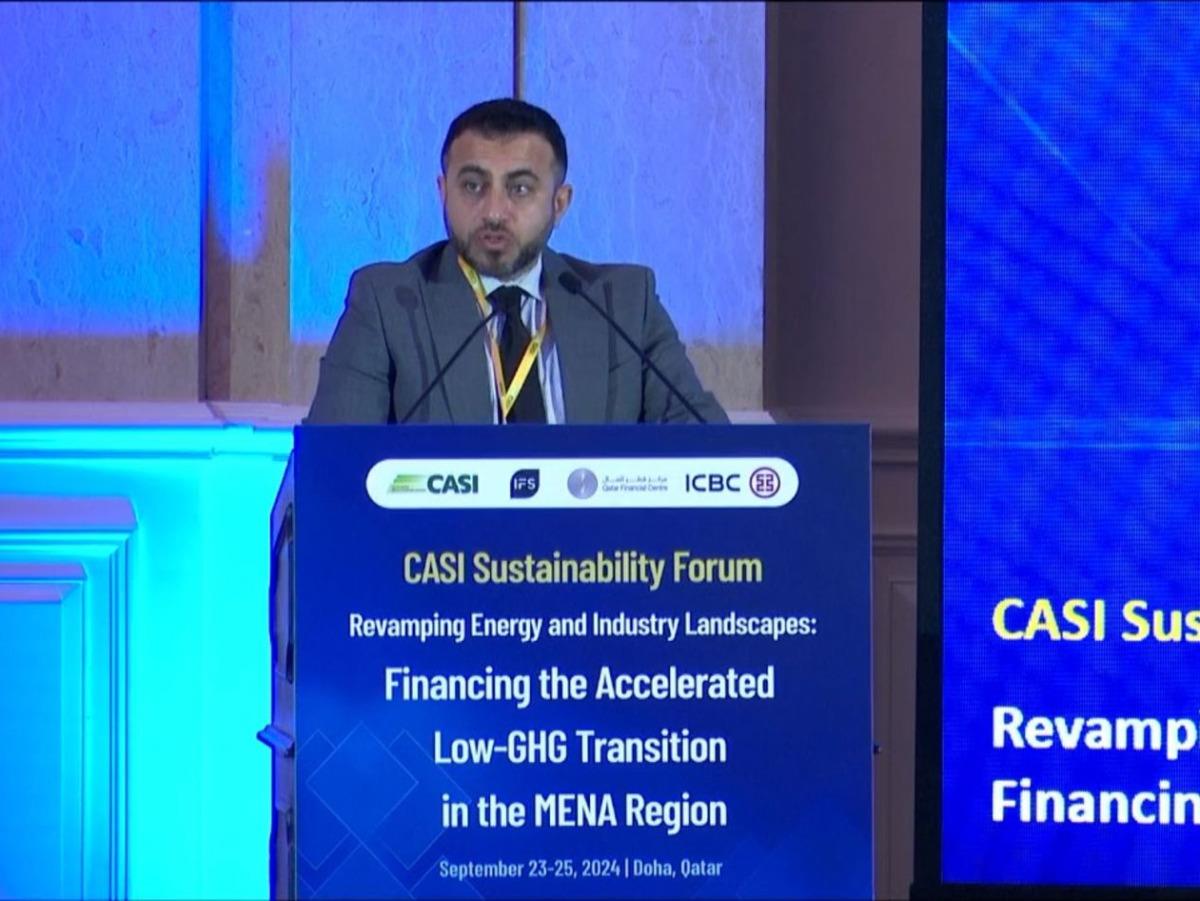
GCC Well Positioned To Invest In Green Tech, Sustainable Infrastructure
Doha, Qatar: Qatar has made strategic investments to reduce its carbon footprint in line with the Qatar National Vision 2030. The Gulf Cooperation Council (GCC) with its financial resources and strategic vision is well positioned to be a leader in low carbon transition by fostering innovation, attracting private capital and embracing low carbon technologies.
The CASI Sustainability Forum, 'Revamping Energy and Industry Landscapes: Financing the Accelerated Low-GHG Transition in the MENA Region' was co-hosted by the Capacity-building Alliance of Sustainable Investment (CASI), the Institute of Finance and Sustainability (IFS), the Industrial and Commercial Bank of China, and the Qatar Financial Centre (QFC), yesterday for the second day with the theme of 'Financial Support to Sectoral Low-carbon Transitions'.
Delivering the keynote speech, Dr. Sa'd Abdel-Halim Shannak, Researcher at Qatar Environment and Energy Research Institute (QEERI), Hamad Bin Khalifa University (HBKU) highlighted the critical issue at the heart of global climate strategy, which is financial support for sectoral low carbon transitions. He also explained how GCC region can move towards a low carbon economy.
Across the globe, there is increasing recognition about global warming and achieving net zero targets and major sectors like energy, transportation, industry, must undergo significant transformation.
Highlighting the role of financial support of low carbon transition in the GCC, Dr. Shannak said, the GCC countries are very well known for their vast hydrocarbon resources. Historically the region's economies have been fueled by oil and natural gas. However, as the world shifts toward the renewable and decarbonization, the GCC faces a big challenge, but also a big opportunity.
One area where the GCC has already begun to see changes is the energy sector. Qatar is a key player in both the energy industry and the global liquefied natural gas (LNG). The country is heavily reliant on fossil fuel but has recognised the need to diversify its energy resources and made strategic investments to reduce its carbon footprint. For instance, Qatar's National Vision 2030 outlines clear goals for sustainable development with a strong emphasis on environmental protection and energy efficiency.
In line with this vision, Qatar is developing of one of the largest solar energy projects in the region, Al Kharsaah solar power plant. This is $467m project, which is expected in rate around 800 megawatts of electricity, contributing significantly to Qatar's efforts to shift towards renewable energy. Additionally, the country has been exploring carbon capture and storage technologies to mitigate emissions from its LNG industry, positioning itself as a leader in the global CCS market, he said.
However, for the GCC to fully capitalise on the opportunities in this space, more financial innovation is required.
He added, Currently, global estimates suggest that transition to low carbon economies will require four to six trillion annually by 2030.
And while much of these investments will come from advanced economies, the GCC has a unique position as one of the wealthiest nations globally with significant sovereign wealth fund the GCC cannot only finance its domestic transition, but also invest globally in green technologies. sustainable infrastructure.
So, the region must, however, overcome several hurdles first, there is a need to attract private investments in renewable energy and green technology projects.
Innovative financing mechanisms like green bonds, carbon pricing and public private partnerships will be critical to attracting the necessary capital.
With substantial financial backing, the GCC could become a leader in carbon sequestration technologies, not only reducing its own emissions but also providing solutions to the broader global community, Dr. Sa'd Abdel-Halim Shannak said.
As the world moves towards a low carbon future, financial support will play a crucial role in ensuring that sectors such as energy, transport and industry make the necessary transitions. While the challenges are substantial, the opportunities are equally vast, he added.
Day two of the forum also saw three panel discussions which delved into crucial topics namely, 'Financing for Low-GHG Transition in Industries', 'Carbon Trading as a Policy Lever to Unlock Sustainability Potentials in the Mena Region', and 'Financial Technology and its Role in Sustainable Financing.'

Legal Disclaimer:
MENAFN provides the
information “as is” without warranty of any kind. We do not accept
any responsibility or liability for the accuracy, content, images,
videos, licenses, completeness, legality, or reliability of the information
contained in this article. If you have any complaints or copyright
issues related to this article, kindly contact the provider above.


















Comments
No comment